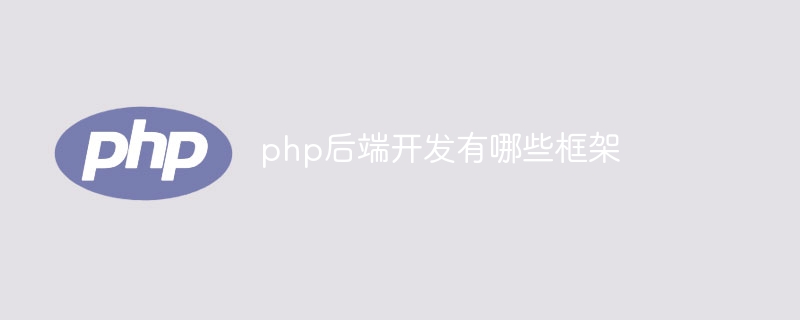
The frameworks for php back-end development include: 1. Laravel, one of the most popular PHP frameworks; 2. Symfony, a powerful and modular PHP framework that provides many components and tools; 3. CodeIgniter, a lightweight PHP framework, suitable for small and medium-sized projects; 4. Yii, a high-performance PHP framework, suitable for large and complex web application development; 5. Phalcon, a high-performance PHP framework, written in C Language and written in Zephir and so on.

The operating system of this tutorial: Windows10 system, PHP version 8.1.3, DELL G3 computer.
PHP back-end development is a very widely used development method at present. It has the advantages of flexibility, efficiency, and fast development speed. At the same time, in order to improve development efficiency and code quality, many PHP developers choose to use frameworks for development. A framework is a development tool that provides a series of functions, classes, toolsets, and templates to help developers quickly build stable and reliable Web applications. The following will introduce some commonly used PHP back-end development frameworks. These frameworks are free and open source, with active community support and a large developer base.
1. Laravel: Laravel is one of the most popular PHP frameworks currently. It uses concise and elegant syntax and powerful functions to provide a complete set of development tools and feature sets, including database migration, routing system, ORM (Object Relational Mapping), template engine, etc. Laravel also has many extension packages that can help developers build web applications more quickly.
2. Symfony: Symfony is a powerful and modular PHP framework that provides many components and tools to facilitate developers to build maintainable and scalable applications. Symfony adopts the MVC (Model-View-Controller) architecture and also supports other architectural patterns, such as RESTful API development. It has many features such as a flexible routing system, template engine, and database abstraction layer to meet various project needs.
3. CodeIgniter: CodeIgniter is a lightweight PHP framework suitable for small and medium-sized projects. It has a flexible architecture and clean code, making it easy to learn and use. CodeIgniter provides a large number of libraries and helper functions, including commonly used functions such as form validation, file upload, image processing, and session management. It also supports the MVC architecture, but its use is not required.
4. Yii: Yii (short for "Yes It Is") is a high-performance PHP framework suitable for large and complex web application development. Yii provides a rich feature set, including database abstraction layer, caching, RESTful API support, etc. It supports MVC architecture and has a powerful code generator that can help developers generate code more quickly. Yii also has an active community and a large number of extension packs to meet project needs.
5. Phalcon: Phalcon is a high-performance PHP framework. Unlike other frameworks, it is written in C language and Zephir. This makes Phalcon faster and more efficient than other pure PHP frameworks. Phalcon provides a complete set of tools and components, including ORM, routing system, cache, view engine, etc. Phalcon also has rich documentation and an active community that can provide timely technical support.
The above are some of the more popular PHP back-end development frameworks. Of course, the choice of framework should be determined based on specific project needs, team experience, and personal preference. Each framework has its own characteristics and advantages. Developers need to choose the most suitable framework for development based on the actual situation. No matter which framework you choose, understanding its principles and usage specifications, and using it flexibly can improve development efficiency and code quality, making PHP back-end development more efficient and sustainable.
The above is the detailed content of What are the frameworks for php backend development?. For more information, please follow other related articles on the PHP Chinese website!